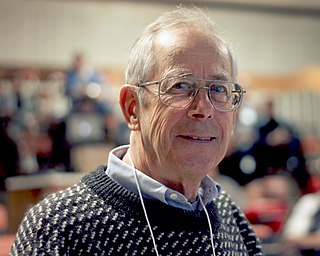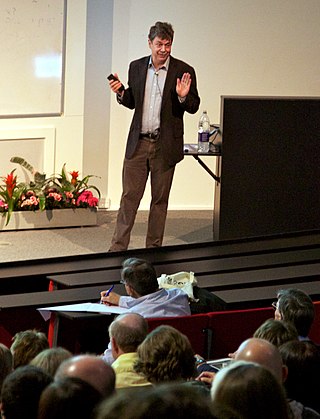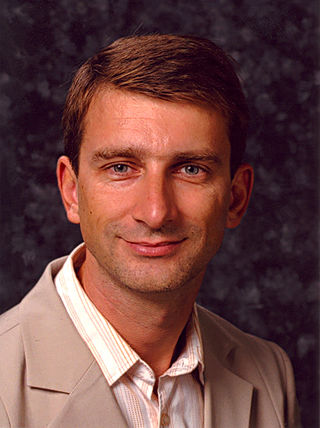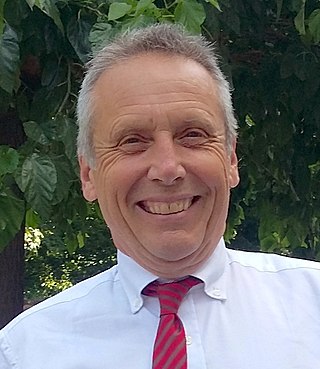Related Research Articles

Sandra Moore Faber is an American astrophysicist known for her research on the evolution of galaxies. She is the University Professor of Astronomy and Astrophysics at the University of California, Santa Cruz, and works at the Lick Observatory. She has made discoveries linking the brightness of galaxies to the speed of stars within them and was the co-discoverer of the Faber–Jackson relation. Faber was also instrumental in designing the Keck telescopes in Hawaii.

Wallace Leslie William Sargent was a British-born American astronomer and the Ira S. Bowen Professor of Astronomy at California Institute of Technology.

Phillip James Edwin Peebles is a Canadian-American astrophysicist, astronomer, and theoretical cosmologist who was Albert Einstein Professor in Science, emeritus, at Princeton University. He is widely regarded as one of the world's leading theoretical cosmologists in the period since 1970, with major theoretical contributions to primordial nucleosynthesis, dark matter, the cosmic microwave background, and structure formation.

Richard Salisbury Ellis is Professor of Astrophysics at the University College London. He previously served as the Steele Professor of Astronomy at the California Institute of Technology (Caltech). He was awarded the 2011 Gold Medal of the Royal Astronomical Society, in 2022 the Royal Medal of the Royal Society and in 2023 the Gruber Prize in Cosmology.

James Edward Gunn is the Eugene Higgins Professor of Astronomy at Princeton University. Gunn's early theoretical work in astronomy has helped establish the current understanding of how galaxies form, and the properties of the space between galaxies. He also suggested important observational tests to confirm the presence of dark matter in galaxies, and predicted the existence of a Gunn–Peterson trough in the spectra of distant quasars.
Robert Charles Kennicutt, Jr. FRS is an American astronomer. He is currently a professor at Texas A&M University. He is a former Plumian Professor of Astronomy at the Institute of Astronomy in the University of Cambridge. He was formerly Editor-in-Chief of the Astrophysical Journal (1999–2006) and became a co-editor of the Annual Review of Astronomy and Astrophysics as of 2021. His research interests include the structure and evolution of galaxies and star formation in galaxies.
Marc Davis is an American professor of astronomy and physics at the University of California, Berkeley. Davis received his bachelor's degree from the Massachusetts Institute of Technology in 1969, his Ph.D from Princeton University in 1973 and has been elected to both the National Academy of Sciences (1991) and the American Academy of Arts and Sciences (1992). He taught for a year at Princeton, 1973–74, then was on the astronomy faculty at Harvard from 1975 to 1981. Since 1981, he has been on the faculty of the Department of Astronomy and Physics at the University of California at Berkeley.

Robert P. Kirshner is an American astronomer, Chief Program Officer for Science for the Gordon and Betty Moore Foundation, and the Clownes Research Professor of Science at Harvard University. Kirshner has worked in several areas of astronomy including the physics of supernovae, supernova remnants, the large-scale structure of the cosmos, and the use of supernovae to measure the expansion of the universe.

Charles L. Bennett is an American observational astrophysicist. He is a Bloomberg Distinguished Professor, the Alumni Centennial Professor of Physics and Astronomy and a Gilman Scholar at Johns Hopkins University. He is the Principal Investigator of NASA's highly successful Wilkinson Microwave Anisotropy Probe (WMAP).
The Gruber Prize in Cosmology, established in 2000, is one of three prestigious international awards worth US$500,000 awarded by the Gruber Foundation, a non-profit organization based at Yale University in New Haven, Connecticut.

Kenneth Charles Freeman is an Australian astronomer and astrophysicist who is currently Duffield Professor of Astronomy in the Research School of Astronomy and Astrophysics at the Mount Stromlo Observatory of the Australian National University in Canberra. He was born in Perth, Western Australia in 1940, studied mathematics and physics at the University of Western Australia, and graduated with first class honours in applied mathematics in 1962. He then went to Cambridge University for postgraduate work in theoretical astrophysics with Leon Mestel and Donald Lynden-Bell, and completed his doctorate in 1965. Following a postdoctoral appointment at the University of Texas with Gérard de Vaucouleurs, and a research fellowship at Trinity College, Cambridge, he returned to Australia in 1967 as a Queen Elizabeth Fellow at Mount Stromlo. Apart from a year in the Kapteyn Institute in Groningen in 1976 and some occasional absences overseas, he has been at Mount Stromlo ever since.

Simon David Manton White, FRS, is a British-German astrophysicist. He was one of directors at the Max Planck Institute for Astrophysics before his retirement in late 2019.

Heidi Jo Newberg is an American astrophysicist known for her work in understanding the structure of our Milky Way galaxy. Among her team's findings are that the Milky Way is cannibalizing stars from smaller galaxies and that the Milky Way is larger and has more ripples than was previously understood. She is a founding participant in the Sloan Digital Sky Survey (SDSS) and the Sloan Extension for Galactic Understanding and Exploration (SEGUE), and is a leader of the astrophysical MilkyWay@home volunteer computing project team. She is a professor in the Department of Physics, Applied Physics, and Astronomy at Rensselaer Polytechnic Institute (RPI) in Troy, New York, US, and a Fellow of the American Physical Society.
George Petros Efstathiou is a British astrophysicist who is Professor of Astrophysics (1909) at the University of Cambridge and was the first director of the Kavli Institute for Cosmology at the University of Cambridge from 2008 to 2016. He was previously Savilian Professor of Astronomy at the University of Oxford.

Uroš Seljak is a Slovenian cosmologist and a professor of astronomy and physics at University of California, Berkeley. He is particularly well-known for his research in cosmology and approximate Bayesian statistical methods.
Marc Kamionkowski is an American theoretical physicist and currently the William R. Kenan, Jr. Professor of Physics and Astronomy at Johns Hopkins University. His research interests include particle physics, dark matter, inflation, the cosmic microwave background and gravitational waves.
Alice Eve Shapley is a professor at the University of California, Los Angeles (UCLA) in the Department of Physics and Astronomy. She was one of the discoverers of the spiral galaxy BX442. Through her time at University of California, Los Angeles (UCLA) she has taught Nature of the Universe, Black Holes and Cosmic Catastrophes, Cosmology: Our Changing Concepts of the Universe, Galaxies, Scientific Writing, AGNs, Galaxies, *and* Writing, and The Formation and Evolution of Galaxies and the IGM. Shapley has committed herself to over a two decades of research and publication in the interest of physics and astronomy.
Kurt Ludvig Adelberger is an American astrophysicist and sustainability manager, who formerly worked at Google as a principal in energy and sustainability and was previously the Engagement Manager for McKinsey & Company.

Smadar Naoz is an Israeli-American astrophysicist, and was the 2015 winner of the Annie Jump Cannon Award in Astronomy for her scientific contributions to the fields of cosmology and planetary dynamics.

Nicholas Kaiser was a British cosmologist. He is the son of Thomas Reeve Kaiser.
References
- ↑ "Charles C. Steidel received the Helen B. Warner Prize 1997 of the American Astronomical Society.", Physics Today, 50 (7): R76, 1997, Bibcode:1997PhT....50R..76., doi:10.1063/1.2806688
- ↑ "Chuck Steidel's Homepage".
- ↑ "cv09.dvi" (PDF). www.astro.caltech.edu. Retrieved 2024-12-15.
- ↑ "Charles C. Steidel Wed to Miss Hoyt", The New York Times, November 8, 1987